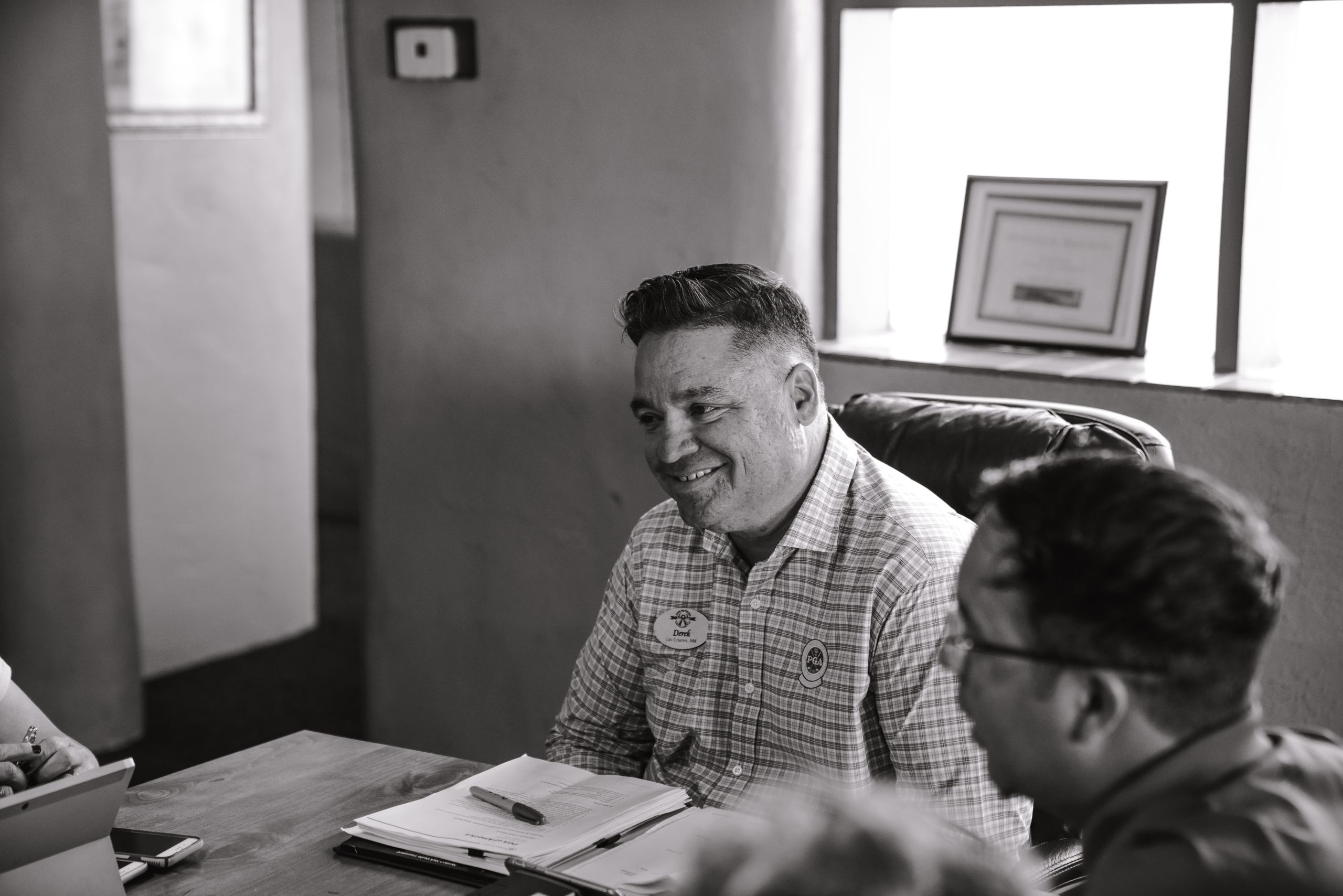Human Research Ethics: An Introduction to the Guiding Principles
Experiential Education

Objectives
On the completion of this module you will learn:
- How human research is defined
- The underlying principles, and codes of conduct, that guide researchers
- How historical cases of unethical behaviour in research have informed frameworks by highlighting the consequences
- The potential risks involved in human research and how to minimise these

Introduction
In just about every area of society, there's nothing more important than ethics.
As part of the Associate Degree Program at the University College, you will at some point be expected to conduct human research. For example, when engaged in fieldwork in a work integrated learning experience. This module concentrates on the ethics of human research, particularly the guiding principles. You will learn about what constitutes human research, and be introduced to some of the main ethical and moral considerations.
To further ensure you understand the potential impacts that your actions may have on others some examples of historical cases of unethical practices are included in this module.
We hope that by learning about the principles and past mistakes made in human research, you will have an understanding of how to minimise risks. These risks, for example, may include unintentionally harming others or compromising yourself. On completing this module, we anticipate you will understand how to ethically conduct human research when engaged in work integrated learning experiences for this course.
What is Human Research?
According to the National Statement of Ethical Conduct in Human Research (2015, p. 3), any research that is “with or about people, or their data and tissue”, is considered human research. Participation in research may include:
- Completing surveys or interviews
- Undergoing treatment or testing (i.e. medical, psychological or physiological)
- Being observed
- Analysis of personal documents or information
- Collection and use of body tissue, organs or fluids
In most situations this kind of research, particularly as it involves human interaction, requires a formal review (i.e. by a committee), as moral and ethical responsibilities must be considered. Even if the research does not require a review from an ethics committee, it is important to understand the ethical implications of what you do when interacting with others.
In most cases, social researchers don’t intentionally mean to cause harm, but you never know what can happen. For instance, when interacting with others, analysing what they say or do and reporting on it, you can cause psychological, physical or emotional harm without meaning to. Therefore, interacting with others and documenting it comes with moral and ethical responsibilities – even if it is not being called ‘human research’. For example, throughout the course of your studies at the University College, you will be engaged in various work integrated learning (WIL) experiences. Many of these will involve working with others, and in some cases, observing practices and reporting or reflecting on these. This is most likely to occur when the WIL type is fieldwork; where you will plan a field-based study including data collection, data management, and data use. When you do fieldwork, you will collect data from a range of sources, in various ways, and from particular places.
There will also be times when you are observing behaviour and requesting information on site visits or internships, for example, and even though you may not technically be ‘doing fieldwork’; you will still need to consider the moral and ethical implications of reporting on what you experience.
Similar may be said for reporting on work placements, or an experience in a simulated environment or when reflecting on something in your own workplace.
Writing is a medium of communication that represents language through the inscription of signs and symbols. In most languages, writing is a complement to speech or spoken language. Writing is not a language but a form of technology. Within a language system, writing relies on many of the same structures as speech, such as vocabulary, grammar and semantics, with the added dependency of a system of signs or symbols, usually in the form of a formal alphabet. The result of writing is generally called text, and the recipient of text is called a reader. Motivations for writing include publication, storytelling, correspondence and diary. Writing has been instrumental in keeping history, dissemination of knowledge through the media and the formation of legal systems.
Activity #1
Historical cases of unethical practice - what do you already know? To begin the engagement activity for this module, go to the PebblePad template and answer the first pre-reading prompts. Keep this tab open in your browser to continue working on the activity.
Make a note of anything that comes to mind now, before you continue with this module.
Take a photograph of these notes as artefacts and upload to your Professional Portfolio as evidence of engagement in the module, or do them as a blog.
Codes of Conduct and Guidelines
Core Values
There are various codes of conduct, guidelines, policies and statements around the ethics of human research. These have been developed largely in response to unethical and immoral research practices from years gone by (this is discussed later in the module). In Australia, researchers are guided largely by the National Statement of Ethical Conduct in Human Research (last modified/updated in 2015). In addition, the University of Tasmania has a Research Ethics Policy that is guided by the National Statement and other codes exist such as those that guide health research with Aboriginal and Torres Strait Islander People and legislation such as the privacy act.
Please read the National Statement and other above-mentioned documents (see links below) to familiarise yourself with the codes of conduct that govern researchers, particularly if you are doing fieldwork and/or collecting data as part of your work integrated learning experience.
One reason for this, is so you fully understand the core values in ethical conduct and key factors to consider as noted in the National Statement:
- Respect for human beings (e.g. privacy, confidentiality, cultural sensitivities, autonomy)
- Research merit and integrity (e.g. there are social and individual benefits and a contribution to knowledge, and appropriate methods and conduct are applied)
- Justice (e.g. fair inclusion and recruitment of participants, and no burden or exploitation on those involved)
- Beneficence (e.g. researchers are to prioritise the welfare of the participant and the benefits outweigh the risks)
If you act in accordance with these core values, it is more likely you will behave how it is recommended, when doing research. Because, even when you have the best of intentions, things can and do go wrong; so, the code of conduct better protects you and the participants. The following notes some of the factors that come into play when doing research with people. These are the kinds of things that create dilemmas, but the list is not comprehensive. It is only an introduction to the key considerations in research as a starting point for you.

Ethical Considerations
Ethical considerations are critical in social research and life more generally. So, whether you are engaged in a research project that requires a formal ethical review by a committee or engaged in a WIL experience, that does not require a formal review; you will no doubt face a dilemma of some kind. The key concerns in research (and when engaged in WIL experiences and reporting on it) will generally be around:
- Informed Consent - It is crucial that those who are part of the research or being observed or interviewed consent to it. This means making sure they really know what they are agreeing to (i.e. what is involved, how the data will be used, who will see the data, what the purpose of the research is and the potential risks and benefits). You are not allowed to coerce anyone into research and participation must be voluntary. It is recommended that researchers develop an information sheet that communicates all of this.
- Confidentiality - Protecting the identity of the participants you are collecting data on and then reporting on is important. Researchers and students should do all that is possible to 'de-identify' data. There are several ways to do this; for example, simply disguise or mask names and use a safe storage system.
- Minimising Harm - You must also do everything you possibly can to minimise harm to those involved. This is typically about eliminating the risks of emotional or psychological discomfort or distress, and invading privacy or breaching rights. It is therefore important to consider the impact on participants around how you collect the data, analyse it and report on it. In bioethics research, however, you would also have to think about minimising physical risk. At this stage, bioethics projects are not part of the associate degree programs, so we recommend you focus on the other potential impacts.
- Relationships - Another key factor to consider in human research is how you develop and maintain relationships with participants, school and work colleagues, funding bodies, partners or other organisations. Values such as respect, honesty and integrity are worth upholding – at minimum.By considering these factors – and acting accordingly, you can minimise the risk of harm and increase the likelihood of benefit to participants. It is important to understand, however, that there are multiple factors to consider that have not been covered in this introduction, including mis-representation (i.e. falsification or fabrication of data) and plagiarism, among others.
See Israel and Hersh (2011) and the National Statement of Ethical Conduct for greater depth on ethical considerations in research.

Vulnerable Cohorts
In addition to the above, it is important you understand that some people, or groups of people, are more at risk than others. Hence, this needs to be considered or you may be acting unethically without even realising it. For example (adapted from the National Statement):
- Women who are pregnant
- Children and young people
- People in dependent or unequal relationships
- People highly dependent on medical care who may be unable to give consent
- People with a cognitive impairment, an intellectual disability, or a mental illness
- People who may be involved in illegal activities
- Aboriginal and Torres Strait Islander Peoples
- People in other countries
We therefore recommend that you explore the documents and websites below, either now or after completing this module. In doing so, it will better enable you to understand the ethical responsibilities, principles and values in research and respond to survey/quiz questions associated with this module.
Short Video Clips on Ethics
Two short video clips that provide insight into ethical considerations, and principles in research have been included here. Both cover the basics of human research ethics and we recommend you watch them.
Three Questions on Ethics | 1:37mins
Research Ethics | 7:12 mins

Case Study
Ethics in Research with Adolescent Females
by Dr Cherie Hawkins
A few years ago, I did a research project that explored the life goals of teenage girls in the Cradle Coast region of Tasmania. To fairly recruit, and to abide by the Ethics Committee directives and Education Department policies, I sent invitations to participate to all secondary school principals and asked them to place an advertisement in their school newsletter about my study. The advertisement had my direct contact details so that anyone interested was not coerced or felt that they had to participate because they were asked by a teacher or their school principal.
From there, I had to ensure that any females who contacted me, had an information sheet detailing the study including what it was about, what it involved, why I was doing it, how they might benefit and what I would do with the findings. Then the girls had to obtain parental permission as they were under 18 years of age and consent forms had to be signed by them and their mother or father or primary care giver.
My research involved interviewing and collecting artefacts (e.g. goal maps, images, photographic collages, values and identity mind maps or lists, poems, drawings, letters, award certificates, artwork, career plans). Due to the nature of the research – I was asking personal questions - I had to take care in how I did everything and constantly think about the potential impacts of what I said, how I responded, and how I reported on findings.
On completion of the data collection, I had to ask the participants to review the transcripts from the interviews and tell me what parts they wanted to clarify or retract. This is often called ‘participant confirmation’ or ‘member checking’. Then, I had to de-identify the data by changing the names of the participants and the places/towns they lived in and the school they attended. I could not use any photographs, or artefacts that could reveal the identity of the participant but they were excellent prompts for conversation.
I had to take great care that I did not mis-represent them or write about them in a more glorified way, meaning that I had to ensure no fabrication or falsification. I struggled with this a great deal as I was always aware of the fact that one day, they could pick up my research findings and potentially be upset about how I ‘told their story’.
As the region is rural and ‘everyone knows everyone’, I had to be very careful if I saw any of the girls out in the community as talking to them could alert someone to them being a participant in my research. And, I was not permitted to talk with teachers, principals or parents (or anyone) about what the girls said to me. This was difficult for one parent to understand as her daughter was disengaged from school at the time and she became frustrated with me because I couldn’t tell her what her daughter’s hopes for her future were.
Before I could commence the research, I had to apply for ethics approval and justify the need for the study based on the literature, including why the focus was on rural females and not males (as it could be seen as unfair). I also had to detail reasons for interviews and collecting artefacts, asking the types of questions I had planned, how I would store the data, what I would do with the findings and much more.
At the end of the day, the thing I found the hardest was maintaining a professional relationship with the participants. I was not allowed to be their friend, or their counsellor, that would not be okay. Yet, they disclosed personal information and told me things that they couldn’t tell anyone else, which often made it difficult for me to hold back, especially if they asked advice or needed a shoulder to cry on. But, I had to keep my emotions at bay and I had to be ‘the researcher’. Certain lines just cannot be crossed, hence the importance of ethics committees, codes of conduct and guidelines.
It really depends on the nature of the research to a certain degree, but you must always remember, ‘how will my actions impact on this person?’ and constantly think about the consequences of what you say and do.
Historical Cases of Unethical and Immoral Research
As briefly noted earlier in this module, a key factor behind the development of codes of conduct stems from unethical practices in research from the past. Some of these we recommend you explore to further your understanding of why there are codes of conduct, include:
- The Tuskegee Syphilis Study
- The Little Albert Experiment
- The Asch Conformity Study
- Research by German and Japanese Scientists during WW2
- The Willowbrook State School Study
- The Stanley Milgram Study
- The Stanford Prison Experiment
- The Monster Study
Some responses to unethical research, such as that mentioned briefly above, include:
- The Nuremberg Code for research on human subjects is adopted (1947)
- Declaration of Helsinki (1964)
- Introduction of the National Research Act (1974)
- The Belmont Report (1979)
- The Office of Scientific Integrity and the Office of Scientific Integrity Review are established (1989)
Following on from these responses, the year 1999 marks a dramatic increase in the number of lawsuits for unethical research (against universities, pharmaceutical companies, researchers and board members of institutions). These lawsuits potentially triggered the development of more and more ethical codes of conduct, and guidelines. Human research has become more and more regulated and grounded in legislation and as time goes on, we can expect this to continue. Australia’s National Statement of Ethical Conduct in Research, and the American Psychological Association Code of Conduct are only two examples of guidelines that apply, but several others do exist. We recommend you review these codes at minimum and the University of Tasmania policy.
For links to timelines and more information on unethical practices in history please click the buttons below. Some of this material is distressing so be mindful of watching videos (the 4th link) if you find it difficult to do so.
Activity #2
What have you learned from this module?
Return to your Engagement Activity and complete the quiz.
Conclusion
Any research that is conducted "with or about people or their data or tissue", must be guided by ethics. During your work integrated learning experiences, you will be interacting with people, talking about what you heard, saw and did. You will undertake projects that require you to collect data from people, analyse it and report on it. So, in effect, you are doing research informally and ethics must be a high priority.
Always ask for permission to collect and use information or report on observations. In most situations, your teachers would have already sought permission, but if ever in doubt, ask your teacher. Be sure to de-identify names and places if requested to do so. It is not difficult to replace names and places with fake ones if the data is sensitive material. Think about how your actions might impact on others. If you observe or hear something that you feel could compromise a person – think before you write. Or talk with your portfolio coaches, tutors or teachers.

Documents on Ethical Guidelines and Policies
National Statement of Ethical Conduct in Human Research
University of Tasmania Research Ethics Policy
References
National Statement of Ethical Conduct in Human Research. Accessed on June 16th, 2017, from: <https://www.nhmrc.gov.au/_files_nhmrc/publications/attachments/e72_national_statement_may_2015_150514_a.pdf>.
University of Tasmania Research Ethics Policy. Accessed on June 16th, 2017, from: <http://www.utas.edu.au/__data/assets/pdf_file/0004/214789/Research-Ethics-Policy-August-2015.pdf>.
Values and Ethics: Guidelines for Ethical Conduct in Aboriginal and Torres Strait Islander Health Research. Accessed on June 16th, 2017, from: <https://www.nhmrc.gov.au/_files_nhmrc/publications/attachments/e52.pdf>.
Federal Privacy Laws (Australia) – Ethical Considerations. Accessed on June 17th, 2017, from: <https://www.nhmrc.gov.au/health-ethics/human-research-ethics-committees-hrecs/role-human-research-ethics-committees-hrecs-hea >.
The American Psychological Association Code of Conduct. Accessed on June 29th, 2017, from: <http://www.apa.org/ethics/code/index.aspx?item=1>.
Three Questions on Ethics. Accessed on June 26th, 2017, from:< https://www.youtube.com/watch?v=KG9QPGEKChs >.
Ethical Challenges and Standards in Research. Accessed on June 26th, 2017, from:< https://www.youtube.com/watch?v=cNoftyUPk1g>.
NIH Research Ethics Timeline. Accessed on June 26th, 2017, from: <https://www.niehs.nih.gov/research/resources/bioethics/timeline/>.
10 Unethical Experiments. Accessed on June 26th, 2017, from: <http://listverse.com/2008/09/07/top-10-unethical-psychological-experiments/>.
The Good the Bad and the Ugly. Accessed on June 26th, 2017, from: <http://theconversation.com/human-experiments-the-good-the-bad-and-the-ugly-39876>.
Unethical Psychological Experiments. Accessed on June 26th, 2017, from: <http://mentalfloss.com/article/52787/10-famous-psychological-experiments-could-never-happen-today>.
Israel, M., & Hersh, D. (2011). Research ethics: From postgraduate to social scientist. Sage Publications.